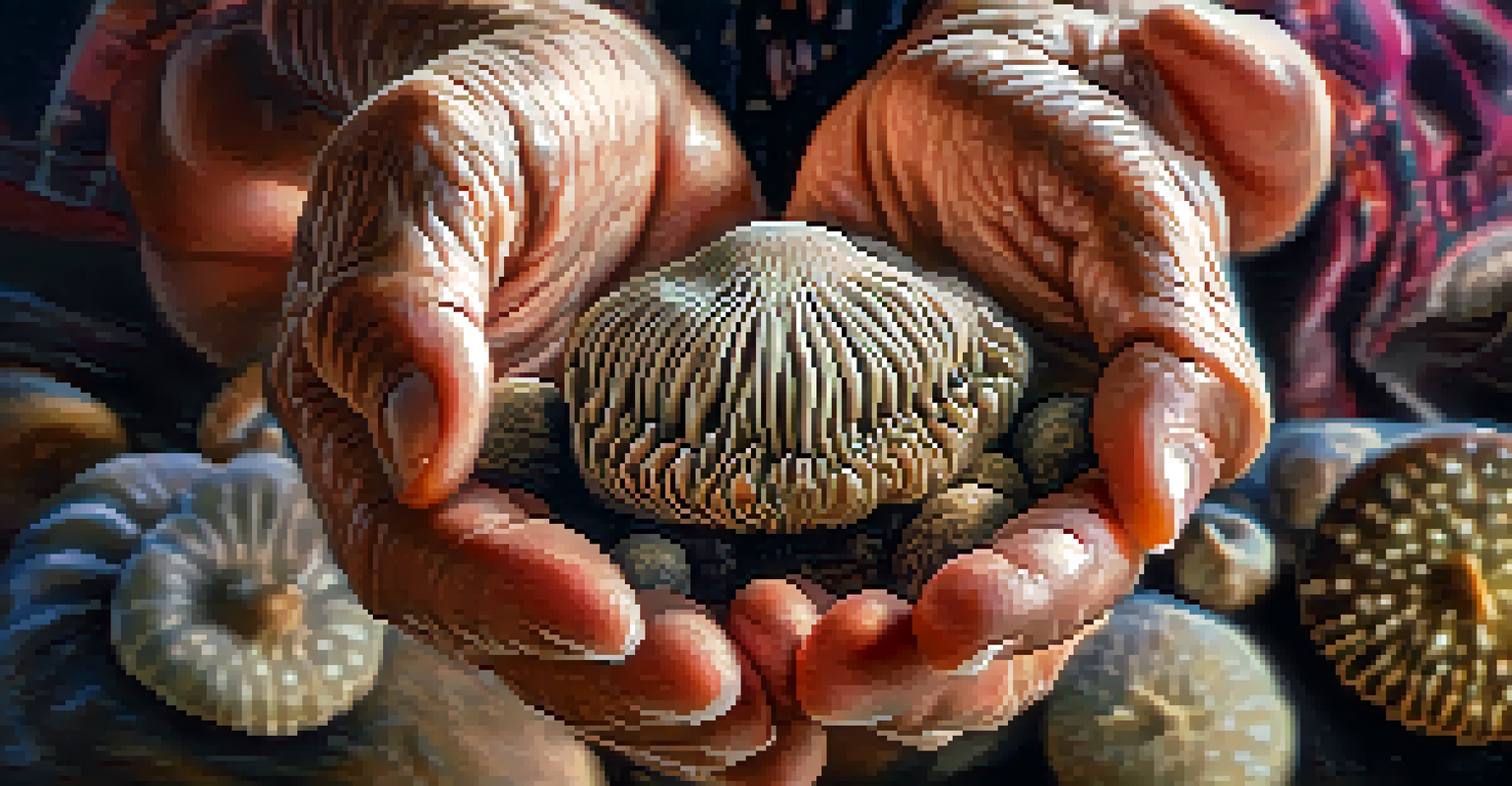Potential Benefits of Psychedelics for Age-Related Disorders

Understanding Psychedelics and Their Mechanisms
Psychedelics are substances that can alter perception and mood, influencing mental states. Common examples include LSD, psilocybin (magic mushrooms), and ayahuasca. These substances work primarily on serotonin receptors in the brain, leading to changes in consciousness that can benefit mental health.
Psychedelics can play a role in helping individuals confront their fears and anxieties, particularly around death and dying.
Research suggests that psychedelics might promote neuroplasticity, the brain's ability to reorganize and form new connections. This is particularly important for older adults who may experience cognitive decline. By encouraging new neural pathways, psychedelics could potentially help the brain adapt and recover from age-related disorders.
Understanding how these substances work is crucial for exploring their potential benefits. By delving into the science behind psychedelics, we can begin to unlock their possibilities for improving mental health, especially in aging populations.
Potential Impact on Depression in Older Adults
Depression can be a significant issue for older adults, often stemming from loneliness or loss. Traditional treatments may not always yield effective results, leading many to seek alternatives. Emerging studies indicate that psychedelics could offer new hope in alleviating depressive symptoms.

For example, clinical trials have shown that psilocybin can lead to substantial reductions in depression scores among participants. The experiences often lead to profound insights and emotional healing, which can be especially beneficial for those grappling with late-life crises or existential concerns.
Psychedelics Enhance Mental Health
Psychedelics may promote neuroplasticity and cognitive function, offering new hope for improving mental health in older adults.
By addressing the root causes of depression through transformative experiences, psychedelics may provide a more effective solution for older adults. This shift could encourage a broader acceptance of these substances in therapeutic settings, allowing for more comprehensive mental health care.
Addressing Anxiety and Fear of Mortality
As people age, anxiety regarding death and dying often increases, leading to significant distress. Psychedelics have shown promise in helping individuals confront and overcome these fears. Many studies reveal that psychedelics can facilitate experiences that alter perceptions of mortality.
The experience of interconnectedness during psychedelic sessions can lead to profound emotional healing and a renewed perspective on life.
Participants in clinical trials often report feelings of interconnectedness and acceptance, which can diminish anxiety about death. These experiences can provide a newfound perspective on life and its impermanence, ultimately fostering peace of mind.
By addressing these existential anxieties, psychedelics could play a vital role in improving quality of life for older adults. This shift in mindset can enhance emotional resilience, allowing individuals to navigate their later years with greater ease.
Enhancing Cognitive Function in Aging Populations
Cognitive decline is a common concern as we age, affecting memory and overall mental function. Recent studies suggest that psychedelics might contribute to cognitive enhancement, offering a beacon of hope for those facing these challenges. By promoting neurogenesis, or the growth of new neurons, psychedelics could help maintain cognitive health.
In research settings, participants using psychedelics have demonstrated improvements in tasks requiring memory and problem-solving skills. This potential for cognitive enhancement could be life-changing for older adults, enabling them to remain engaged and active in their communities.
Addressing Depression and Anxiety
Emerging research indicates that psychedelics can alleviate depressive symptoms and anxiety related to mortality in aging populations.
By exploring the cognitive benefits of psychedelics, we can better understand how they may serve as tools for enhancing mental acuity in aging populations. This could lead to significant advancements in how we approach cognitive health in later life.
Fostering Emotional Well-being and Connection
Emotional well-being is crucial for overall health, especially as we age. Psychedelics have the potential to foster deeper emotional connections, both with oneself and with others. Participants often report heightened empathy and compassion during psychedelic experiences, which can be transformative.
These enhanced emotional connections can help combat feelings of isolation and loneliness that are common among older adults. By nurturing a sense of community and belonging, psychedelics could improve emotional health and life satisfaction.
The ability to cultivate emotional resilience and deeper interpersonal relationships may lead to a more fulfilling life in later years. This aspect of psychedelics could be a game-changer in enhancing the quality of life for aging individuals.
Therapeutic Applications of Psychedelics in Clinical Settings
As interest in psychedelics grows, there's a corresponding shift towards integrating them into therapeutic practices. Clinical settings are beginning to explore how these substances can be safely administered to older adults with various mental health issues. Structured environments can help ensure that experiences are both safe and beneficial.
Therapists trained in administering psychedelics can guide individuals through their journeys, providing support and integration afterwards. This professional guidance can maximize the therapeutic effects while minimizing risks, making it a viable option for older populations.
Therapeutic Use in Clinical Settings
The integration of psychedelics into therapeutic practices could provide safer and more effective mental health care for older adults.
The development of therapeutic frameworks around psychedelics represents a significant step forward in mental health care. By creating safe spaces for exploration, we can harness the potential of these substances to improve mental well-being for aging individuals.
Challenges and Considerations in Psychedelic Research
While the potential benefits of psychedelics are promising, there are significant challenges in researching their effects on older adults. Regulatory hurdles and stigma surrounding these substances can hinder the progress of clinical studies. Navigating these challenges is essential to fully understanding the benefits psychedelics may offer.
Additionally, individual health considerations must be taken into account when exploring psychedelics for older adults. Factors such as existing medical conditions and medications can influence the safety and efficacy of these substances.

By addressing these challenges and fostering open dialogue around psychedelics, we can pave the way for future research. This collaborative effort can ultimately help unlock the therapeutic potential of psychedelics for age-related disorders.
Looking Ahead: The Future of Psychedelics and Aging
The future of psychedelics in addressing age-related disorders looks promising, with ongoing research poised to expand our understanding. As attitudes towards these substances evolve, we may see increased acceptance in both medical and public spheres. This cultural shift could lead to more comprehensive mental health care options for older adults.
Emerging studies may inspire new treatments that incorporate psychedelics, shaping a future where mental health care for aging populations is more holistic. By combining traditional therapies with psychedelic approaches, we can create a richer, more nuanced understanding of mental well-being.
Ultimately, the potential benefits of psychedelics for age-related disorders could revolutionize how we approach mental health in later life. By continuing to explore and embrace these possibilities, we can enhance the quality of life for older individuals.